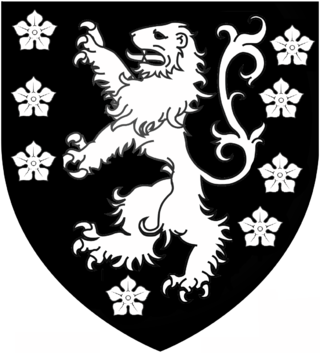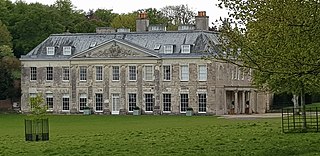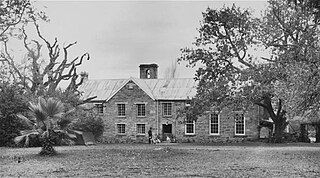Henry Frederick Francis Adair Barrington (28 July 1808 Beckett Hall at Shrivenham in Berkshire - 25 March 1882 Knysna), was a Cape Colony lawyer, farmer and member of Parliament of the Cape of Good Hope. [1] [2]
Returning to England in 1848 he married Mary Georgiana Knox, and they landed at Plettenberg Bay, their cargo including wedding gifts, family heirlooms and furniture, and farming equipment. The building of 'Portland Manor' lasted 16 years, and included eight bedrooms, a library, and a large dining room. He also constructed one of the earliest sawmills for cutting Black Stinkwood, experimented with silkworms and bees, and grew apples with a view to producing cider. His interest in silk production and mulberry trees as food plants led to his being featured in South African writer Dalene Matthee’s novel, "Moerbeibos" ('Mulberry Forest'). The great forest fire of February 1869, in which large parts of the forest between Swellendam and Humansdorp were completely destroyed, also gutted 'Portland Manor'. The following year he was elected to the Cape Parliament. [3] [4]
Henry Frederick Francis Adair Barringto | |
|---|---|
 | |
| Born | 28 July 1808 |
| Died | 25 March 1882 |
| Nationality | Cape Colony |
| Occupation | Lawyer Farmer Member of Parliament.[1][2] |
| Spouse | Mary Georgiana Knox |
Henry was a son of Reverend George Barrington, 5th Viscount Barrington of Ardglass (1761–1829), prebendary of Durham Cathedral and rector of Sedgefield, and Elizabeth Adair (1769–1841). At first he qualified as a lawyer and joined the diplomatic service, becoming attaché in Athens. Resigning from the service, he landed in Cape Town in February 1842, and bought an estate named 'Portland' near Knysna from Thomas Henry Duthie, who had inherited the property from his father-in-law George Rex.











